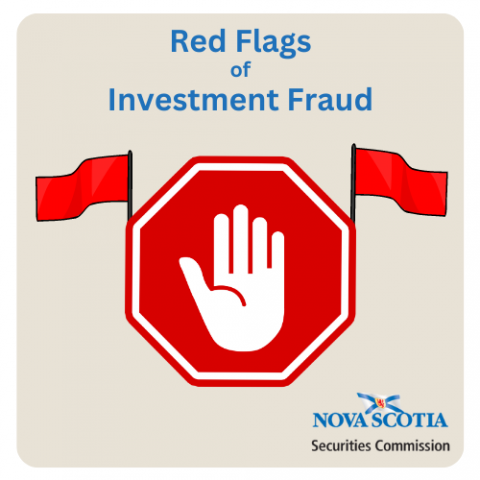Submitted by nsscadmin on

No one plans on being a victim of investment fraud. That’s why everyone should know the red flags of investment fraud so you can identify them and avoid them to protect yourself from fraud. Here are some of the red flags to watch out for.
The firm or individual is not registered
Anyone offering investments in securities in Nova Scotia must be registered with the Nova Scotia Securities Commission, unless an exemption applies. If a person or entity offering you an investment opportunity is not registered and doesn’t have a legitimate reason why, it is a major red flag.
Promised high returns for low or no risk
There is no such thing as a high return lower risk investment. If you can remember only one red flag, remember that. The chance of higher returns always comes with higher risk. If someone is offering you high returns with low or even no risk, it is almost always fraud.
High pressure tactics, you must decide now, FOMO
Fraudsters don’t want to give you time to think things over. They want to separate you from your money as quickly as possible. If someone offering you an investment opportunity does not give you time to think it over, it’s likely because if you did think it over you would not invest. Other high pressure tactics scammers might uses include fear of missing out, using your fears of missing a supposed payday to get you to invest. Don’t let someone talk you into handing over your money just because “everyone else is investing and you’ll be the only one that doesn’t get rich.”
Providing inside or secret information, say they’re making an exception for you
Someone offering your supposed secret or inside information is suspect because there is no way to verify what they are offering. Obviously, fraudsters lie, and saying they have secret information that they’re offering only to you to make you feel special and privileged is one way they lie to take advantage of unsuspecting investors.
Lack of credible sources
If you can’t verify the legitimacy of an investment from sources outside the person or entity offering the investment this is a red flag. Many investments offered by fraudsters don’t exist at all, and many times no investment is made with the money they collect from their victims. Make sure the investment is real before handing over any money.
Offshore firms, accounts, transfers
Once money has been transferred offshore it becomes hard to track and much harder to recover. If you’re being asked to deposit or wire money into an offshore account, ask why they’re doing business outside of Canada.
Pay through credit cards, or accessing more money through a line of credit
Fraudsters will often try to talk you into using credit cards or accessing a line of credit or some other form of borrowed money to invest even more in their opportunity. This is a way to not only get more money from their victim, but also to obtain personal information they can use in nefarious ways.
